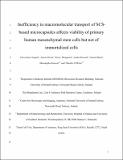| dc.contributor.author | Sanz-Nogués, Clara | |
| dc.contributor.author | Horan, Jason | |
| dc.contributor.author | Thompson, Kerry | |
| dc.contributor.author | Howard, Linda | |
| dc.contributor.author | Ryan, Gerard | |
| dc.contributor.author | Kassem, Moustapha | |
| dc.contributor.author | O'Brien, Timothy | |
| dc.date.accessioned | 2019-08-20T10:45:17Z | |
| dc.date.available | 2019-08-20T10:45:17Z | |
| dc.date.issued | 2015-05-01 | |
| dc.identifier.citation | Sanz-Nogués, Clara, Horan, Jason, Thompson, Kerry, Howard, Linda, Ryan, Gerard, Kassem, Moustapha, & O'Brien, Timothy. (2015). Inefficiency in macromolecular transport of SCS-based microcapsules affects viability of primary human mesenchymal stem cells but not of immortalized cells. Journal of Biomedical Materials Research Part A, 103(11), 3676-3688. doi: 10.1002/jbm.a.35493 | en_IE |
| dc.identifier.issn | 1552-4965 | |
| dc.identifier.uri | http://hdl.handle.net/10379/15328 | |
| dc.description.abstract | Microcapsules made of sodium cellulose sulphate (SCS) and poly-diallyl-dimethyl-ammonium chloride (pDADMAC) have been employed to encapsulate a wide range of established cell lines for several applications. However, little is known about the encapsulation of primary cells including human mesenchymal stem cells (hMSCs). Human MSCs are of interest in regenerative medicine applications due to pro-angiogenic, anti-inflammatory and immunomodulatory properties, which result from paracrine effects of this cell type. In the present work we have encapsulated primary hMSCs and hMSC-TERT immortalized cells and compared their behavior and in vitro angiogenic potential. We found that, although both cell types were able to secret angiogenic factors such as VEGF, there was a marked reduction of primary hMSC viability compared to hMSC-TERT cells when cultured in these microcapsules. Moreover, this applied to other primary cell cultures such as primary human fibroblasts but not to other cell lines such as human embryonic kidney 293 (HEK293) cells. We found that the microcapsule membrane had a molecular weight cut-off below a critical size, which caused impairment in the diffusion of essential nutrients and had a more detrimental effect on the viability of primary cell cultures compared to cell lines and immortalized cells. | en_IE |
| dc.description.sponsorship | The authors acknowledge the facilities and technical assistance of Pierce Lalor from the Centre for Microscopy & Imaging at the National University of Ireland Galway (www.imaging.nuigalway.ie), a facility that is funded by NUIG and the Irish Government's Programme for Research in Third Level Institutions, Cycles 4 and 5, National Development Plan 2007‐2013. | en_IE |
| dc.format | application/pdf | en_IE |
| dc.language.iso | en | en_IE |
| dc.publisher | Wiley | en_IE |
| dc.relation.ispartof | Journal Of Biomedical Materials Research Part A | en |
| dc.rights | Attribution-NonCommercial-NoDerivs 3.0 Ireland | |
| dc.rights.uri | https://creativecommons.org/licenses/by-nc-nd/3.0/ie/ | |
| dc.subject | microencapsulation | en_IE |
| dc.subject | immunoisolation | en_IE |
| dc.subject | sodium | en_IE |
| dc.subject | cellulose | en_IE |
| dc.subject | sulphate | en_IE |
| dc.subject | mesenchymal | en_IE |
| dc.subject | stem cells | en_IE |
| dc.subject | therapeutic angiogenesis | en_IE |
| dc.title | Inefficiency in macromolecular transport of SCS‐based microcapsules affects viability of primary human mesenchymal stem cells but not of immortalized cells | en_IE |
| dc.type | Article | en_IE |
| dc.date.updated | 2019-07-24T09:30:43Z | |
| dc.identifier.doi | 10.1002/jbm.a.35493 | |
| dc.local.publishedsource | https://doi.org/10.1002/jbm.a.35493 | en_IE |
| dc.description.peer-reviewed | peer-reviewed | |
| dc.internal.rssid | 11047629 | |
| dc.local.contact | Clara Sanz Nogues, Remedi, Bioscience Building, Nui Galway. Email: clara.sanznogues@nuigalway.ie | |
| dc.local.copyrightchecked | Yes | |
| dc.local.version | ACCEPTED | |
| nui.item.downloads | 255 | |


